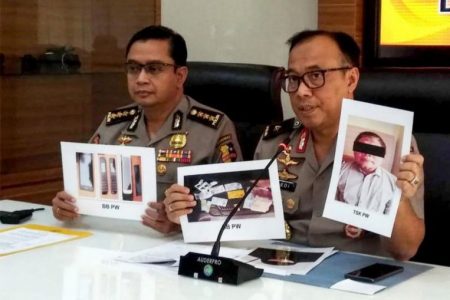
Indonesia uncovers Neo-Jemaah Islamiah terror group that runs oil palm plantation business for funding
The arrest last weekend of an experienced leader of Jemaah Islamiah (JI) has unearthed a new tactic used by the South-east Asia terrorist group.
While militants such as JI had often relied on donations from members and sympathisers, and even robberies, to grow and fund their murderous activities, JI under its so-called “emir” (top leader) Para Wijayanto has been building economic strength by carrying on, among others, a oil palm plantation business in Sumatra and Kalimantan, police said.
Police are calling this group “Neo-JI”, or new JI, as they conduct business while recruiting members and planning to set up a caliphate in the country, said police spokesman Dedi Prasetyo.
As an example of the Neo-JI’s financial strength, Brigadier-General Dedi said its senior officials under Para’s leadership were paid between 10 million rupiah (S$960) and 15 million rupiah a month. This is more than double Jakarta’s minimum guaranteed wages of 3.9 million rupiah a month.
“To build strength, they recruit as many cadres as possible, conduct businesses and then expand. In the long term, their aim is to establish a caliphate in Indonesia,” Brig-Gen Dedi told a media briefing on Monday (July 1). He did not disclose the group’s other businesses besides the oil palm plantation.
Indonesia, the world’s biggest exporter of oil palm, allows companies and well-off individuals to buy land and seeds to grow palm trees. Growers sell the fruits to milling plants for profits.
Anti-terror expert Adhe Bhakti of the Centre for Radicalism and Deradicalisation Studies (Pakar) told The Straits Times that JI operations had relied on donations from its members and funds from Al-Qaeda, the international terror outfit it is affiliated to. The militants had also used illegal means such as robbery and hacking websites.
Imam Samudera, a Bali bomber who was executed in November 2008, robbed a gold and jewellery shop in Banten province, and used some of the money for terror attacks.
Mr Adhe said: “Now they have started to think how to get fund flows sustainably by doing business at the organisation level, such as plantations, property brokerages, car rental and restaurants. Donations from their thousands of members are enough to start businesses.”
Police scored big when Para was arrested early on Saturday morning (June 29) on the outskirts of Jakarta, as he had been on the run for 16 years.
Para is widely believed to be a student of Abu Bakar Basyir, the alleged mastermind of the 2002 Bali bombings that killed more than 200 people.
JI was also behind the 2009 attacks on the JW Marriott and Ritz-Carlton hotels, as well as the Australian embassy in Jakarta.
Four others were also arrested over the weekend, including Para’s wife who played an active role in the organisation. Three others were his closest assistants.
Para, 54, was captured just after 6am in a hotel in Bekasi town, Beritasatu.com online news reported on Sunday, citing a police source.
Before becoming “emir” of neo-JI, Para held various senior positions and was involved in training and recruitment.
He has been on the police’s “priority wanted list” since 2003.
Although the original JI was initially believed to have been decimated in Indonesia following a series of operations by security agencies, counter-terrorism experts had warned that young militants were being recruited and that the JI network may have expanded in the country to a 2,000-strong force.
The “Neo-JI” term was coined by police to describe this new threat.
How dangerous is Para?
Brig-Gen Dedi said the skills of the militants recruited by Para cover intelligence, paramilitary including making bombs and operating rockets, shooting as snipers.
Some of them were sent to Syria to obtain battle and killer skills and later returned to Indonesia.
Between 2013 and 2018, Para recruited and sent six batches of militants to Syria to join paramilitary training as well as to directly participate in battles.
Brig-Gen Dedi did not say how the Neo-JI received the initial capital to start businesses.
Financing is the most critical part of any terror cell, and militants justify robbing banks and jewellery shops to raise funds, experts have said.
Police said Para communicated with terror networks in the Philippines and al-Qaeda affiliated networks in Pakistan and Afghanistan.
Police consider the terrorist as an intelligent individual with 19 years of experience in the terror network.
Para’s wife, initialled MY, who was arrested with him on Saturday, according to police also had an active role in JI. One of those arrested along with Para last weekend was identified by police as BS, who served as a “liaison officer” between Para and the recruited militants who have travelled to Syria.
A fourth suspect had an important role to oversee JI operations in Indonesia, was arrested on Sunday, police said, in a residential complex in Bekasi.
A fifth suspect was nabbed on Sunday in Ponorogo, East Java province, and was in charge of heading JI operations in East Java province.
Source: Straits Times





